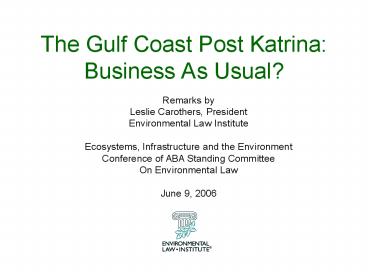The Gulf Coast Post Katrina: Business As Usual? - PowerPoint PPT Presentation
1 / 16
Title:
The Gulf Coast Post Katrina: Business As Usual?
Description:
New Orleans sinking while. sea level rising. Coastal Ecosystem Impacts ... New Orleans home. to poorer and minority. communities ... – PowerPoint PPT presentation
Number of Views:49
Avg rating:3.0/5.0
Title: The Gulf Coast Post Katrina: Business As Usual?
1
The Gulf Coast Post KatrinaBusiness As Usual?
Remarks by Leslie Carothers, President Environment
al Law Institute Ecosystems, Infrastructure and
the Environment Conference of ABA Standing
Committee On Environmental Law June 9, 2006
2
The Gulf Coast Environment
- Productive and diverse coastal ecosystem altered
by - navigation/shipping
- flood control
- oil and gas extraction
- real estate development
Huge and continuing losses of land and
wetlands Old and new development in flood-prone
areas New Orleans sinking while sea level rising
3
Coastal Ecosystem Impacts
Channelization of Mississippi River for
navigation greatly reduced historic silt
deposition 10,000 miles of delta canals for oil
and gas development, extraction, and
pipelines Flood control levees accelerated
development in areas behind them
4
Wetland Degradation and Loss
Louisiana lost 1,900 square miles of wetlands
between 1930-2000 Annual loss 25 square miles
despite better control under wetland protection
permitting 80 square miles lost during Katrina
5
Development in Flood Zones
Low-lying areas of New Orleans home to poorer
and minority communities Coastal areas settled
with higher end residential and resort
development Two thirds of homes flooded were
outside established flood zones
6
The Path Forward
Goal Restore Gulf Coast community on a more
resilient and sustainable basis working with
natural systems Means Better governmental
decisionmaking More rational risk management and
insurance system Private sector leadership and
support
7
Governmental Decisionmaking
It will not be feasible to provide an assured
level of protection for this larger metropolitan
region without first making significant changes
in the organizational structure and interactions
of the national and local governmental bodies and
agencies jointly responsible for this
effort. Seed Report funded by University of
California, Berkeley, and National Science
Foundation (2006)
8
Governmental Decisionmaking (2)
We treated the whole water resources effort
more like a re-election machine than a serious
program, run by local interests, lobbyists,
congressmen and ex-congressmen who are glued to
the status quo. We have a flood control program,
a navigation program, a permitting program, a
coastal management program, a flood insurance
program, a coastal restoration program just for
openers and they do not talk to each
other. Professor Oliver Houck, Tulane
University Law School
9
A New Institution to Guide Louisiana Coastal
Restoration?
Essential players Executive Office of
President, Army Corps Depts. Of Agriculture,
Commerce and Interior EPA, Congressional
representatives governor mayor(s) community
leaders business leaders scientific
experts Essential roles setting goals, project
priorities for funding, capacity to implement
construction and land use decisions, all with
public engagement
10
Possible Models to Build On
Louisiana Task Force on Restoration under federal
CWPPRA (limited scope, funding and
authority) Louisiana Reconstruction Authority
(lacks independent funding and clear authority
over parishes) TVA Light? (could align federal
and state authorities but old style lacked local
and stakeholder involvement)
11
Rational Risk Management The 3Rs
Realism about risks, costs, and who
pays Redundancy in control of flood hazards
(natural and structural) Resilience in community
development
12
Flood Insurance Reform
Current federal system does too little to reduce
damage or cover repair costs. Needed changes
include
- ü Update flood maps
- ü Strengthen local flood zone management and
building code enforcement - ü Mandate insurance in flood zones
- ü Determine real risk-based premiums
- ü Make subsidies explicit
- ü Reduce or eliminate second home and business
subsidies
13
Need for Private Sector Leadership and Support
Oil and gas industry vital to state and national
economy (29 oil and 27 natural gas) but
estimated 50 of wetland loss caused by oil and
gas operations Major investment in levees to
protect real estate development has contributed
to wetland and storm losses
14
Oil and Gas Industry Opportunity to Support
Wetlands Restoration
- Adopt best available practices for facility
development and service - Contribute to restoration through in kind
services (e.g. backfilling canals) and funding - Divert larger share of royalties to state?
- - Surcharge on royalties payable to state?
- Energy users (all of us) should pay
15
Real Estate Industry Opportunity to Support
Sustainable Redevelopment
Support realistic flood maps and building
elevation requirements Advocate incentives for
green rebuilding including energy efficiency
and mold resistant materials Seek subsidies for
better development and not lower standards for
cheaper construction
Elevated house in the Bayou Liberty Area
16
Insanity
Doing the same thing over and over again and
expecting different results. Albert Einstein































